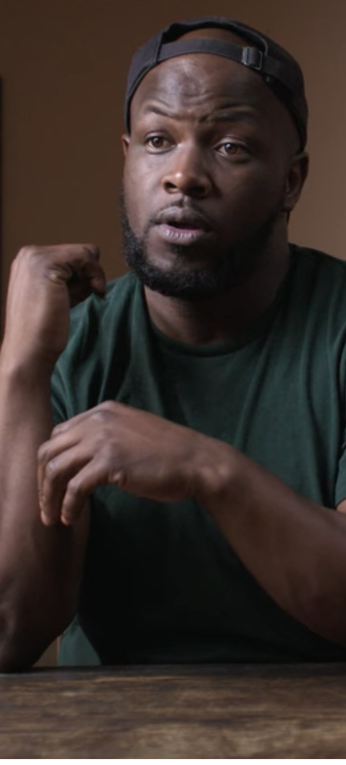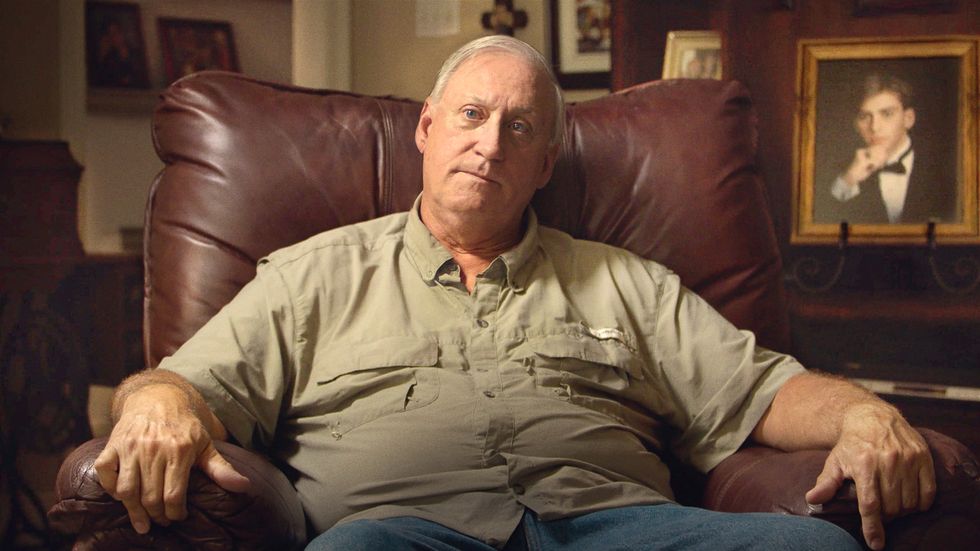Netflix's newest limited documentary series, The Pharmacist, is technically three stories in one show. The series, which discusses the dangerous addictive qualities of Oxycontin and Purdue Pharma's creation of it, doesn't start in on the widespread issues of opioids until Episode Two. But the story that kicks it off is compelling on its own. The event that set the story in motion is the murder of Danny Schneider, a 22-year-old gunned down in 1999 in New Orleans after attempting to purchase crack cocaine.
The story, initially reported out by Jed Lipinski, follows Schneider's father, Dan Sr, who set off on a mission to get justice for Danny's death, starting an independent investigation outside of the local police. That led Dan to a boy named Jeffery Hall, a then-15-year-old who claimed to have information on the murder. By the end of the case, both Schneider and Hall had their lives turned upside down by the truth.
Who is Jeffery Hall?
Hall is one of the three primary talking heads in the documentary's first two episodes. At 15-years-old, the documentary states that Jeffery Hall was known as a neighbourhood kid in the Ninth Ward of New Orleans – an area that many of its residents allude to as riddled with crime at the time of Danny's murder in 1999. After the killing, Dan Sr and his wife hit the streets, posting flyers asking for information on their son's murder. Eventually, the couple raised $10,000 for information leading to the arrest of a suspect. Enter: Jeffery Hall.
Five weeks into the investigation, Hall came forward alleging that he had information. His initial statement said that he was riding up on a bike to meet Danny for a drug deal, but as he approached, he saw a man by the name of ScarFace shoot and kill Danny. That story eventually came up cold, with police discovering that ScarFace was in jail at the time of Danny's murder.
Shane Madding and The Conviction
Deemed an unreliable source, Hall was ruled out of the investigation. But most damning, Dan Sr eventually tracked down Shane Madding, a woman in the neighbourhood who lived across the street from the murder scene. Madding told Dan Sr that she witnessed the murder, further explaining the scene in detail, noting that it was Jeffery Hall, her best friend's son, who had committed the murder. However, for the safety of herself and her family, she couldn't come forward as a witness.
Dan Sr persisted for a year until Madding agreed to come forward and testify. In 2017, The Times-Picayune reported that upon Hall's arrest, Dan Sr stated, "In this not-so-perfect world, it's people like our witness, one by one, telling the truth about what they have seen that will truly make a difference." On November 21, 2000, at 16 years old, Hall agreed to a plea deal. Charged with manslaughter, he was sentenced to 15 years in prison.
In the documentary, Hall states, "I don't feel good about [the murder]. I was just trying to get the heat off me. I just made up a story... I thought I had everything figured out. I was dealing drugs and I thought I was a big boy."
Where Happened After the Fact?
Hall says in the documentary that while incarcerated he finished school and studied data management, eventually being released at the age of 29, serving 13 years of his sentence. "I took that time and tried to better myself... put it all into how it all could have been prevented, but it's still an every day struggle for me," he says in the documentary. "I ask this of myself often: how can I move forward when I know that I did wrong?"
Hall was released in 2013, and participated in the documentary – much of which was filmed in New Orleans – but does not say where he's currently living. Madding left the Ninth Ward community entirely. Previously struggling with a crack cocaine addiction herself, she has since gotten clean, citing in the documentary that she was inspired by Dan Sr's investigation and her own testimony.
Schneider, whose day job was at a pharmacy in the area, returned back to his job where he channeled the grief following his son's murder and subsequent investigation into another investigation of the opioid crisis that he was seeing unfold in New Orleans. His pursuit would eventually help uncover a growing problem in the area, as well as a massive issue with a local physician who was doling out subscriptions to patients who did not know better about the effects of Oxycontin.
Like this article? Sign up to our newsletter to get more delivered straight to your inbox.
Justin Kirkland is a Brooklyn-based writer who covers culture, food, and the South. Along with Esquire, his work has appeared in NYLON, Vulture, and USA Today.














